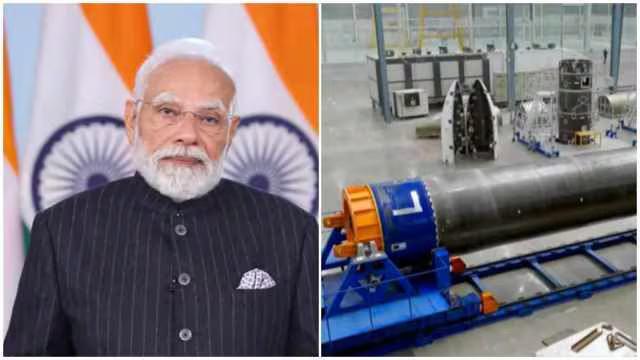
PM Modi Unveils Vikram-1, India’s First Privately Developed Orbital Rocket
In a significant milestone for India’s space sector, Prime Minister Narendra Modi on Thursday inaugurated space startup Skyroot Aerospace’s new Infinity Campus via video conferencing and unveiled Vikram-1, India’s first privately developed orbital rocket. The launch marks a major leap forward for the country’s space industry, which has been dominated by the Indian Space Research Organisation (ISRO) for decades.
During the launch, PM Modi expressed his enthusiasm for the development, stating, “It’s a significant leap forward for India’s space sector.” The Infinity Campus, which was inaugurated by the Prime Minister, is a state-of-the-art facility that will serve as the hub for Skyroot Aerospace’s rocket manufacturing operations. According to Skyroot Founder Pawan Chandana, the campus will have the capability to produce one rocket every month, making it a significant boost to India’s space launch capabilities.
The unveiling of Vikram-1, India’s first privately developed orbital rocket, is a testament to the growing capabilities of the country’s private space industry. The rocket, which is named after Dr. Vikram Sarabhai, a renowned Indian scientist and father of India’s space program, is a significant achievement for Skyroot Aerospace, which was founded in 2018 by Pawan Chandana and Bharath Daka.
Vikram-1 is a single-stage-to-orbit rocket that is designed to carry small satellites into space. The rocket has a payload capacity of up to 300 kilograms and is expected to play a significant role in launching small satellites for commercial and scientific applications. With the development of Vikram-1, India has joined a select group of countries that have the capability to launch orbital rockets privately.
The launch of Vikram-1 is also expected to give a boost to India’s space startup ecosystem, which has been growing rapidly in recent years. The country has seen a surge in the number of space startups, with many of them working on innovative technologies such as satellite manufacturing, launch services, and space-based applications. The success of Skyroot Aerospace and the launch of Vikram-1 are expected to inspire more entrepreneurs to venture into the space sector, driving innovation and growth.
The Indian government has also been actively supporting the growth of the private space industry, with initiatives such as the establishment of the Indian National Space Promotion and Authorisation Centre (IN–SPACe). IN–SPACe is a single-window agency that is responsible for promoting and regulating the private space industry in India. The agency has been working closely with space startups, providing them with access to ISRO’s facilities and expertise, and helping them to navigate the regulatory framework.
The launch of Vikram-1 is also a significant milestone for India’s space program, which has been driven by ISRO for decades. The success of the private space industry is expected to complement ISRO’s efforts, providing a boost to the country’s space launch capabilities and enabling India to emerge as a major player in the global space industry.
In conclusion, the unveiling of Vikram-1, India’s first privately developed orbital rocket, marks a significant milestone for the country’s space sector. The launch is a testament to the growing capabilities of India’s private space industry and is expected to drive innovation and growth in the sector. With the support of the government and the success of space startups like Skyroot Aerospace, India is poised to emerge as a major player in the global space industry.






